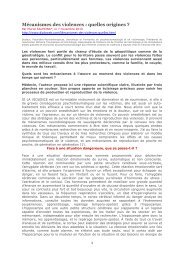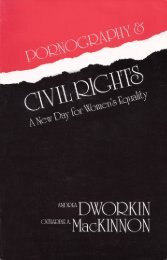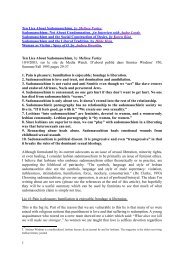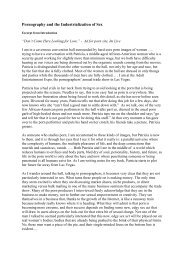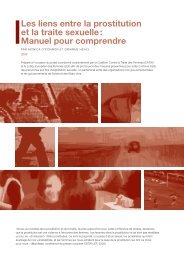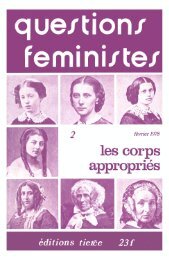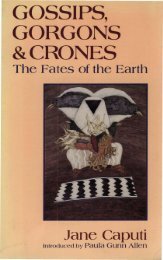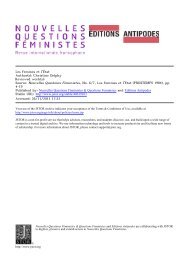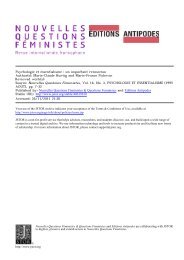Nothing Mat(t)ers: A Feminist Critique of Postmodernism
Nothing Mat(t)ers: A Feminist Critique of Postmodernism
Nothing Mat(t)ers: A Feminist Critique of Postmodernism
Create successful ePaper yourself
Turn your PDF publications into a flip-book with our unique Google optimized e-Paper software.
xxsexual, emotional, political desires: too demanding, he will not satisfy her. Denyingwomen’s desire, politically or sexually, is a male power play. Andrea Nye’s (1988)rewriting <strong>of</strong> the Freud creation story tells <strong>of</strong> male fears <strong>of</strong> the Father’s revenge anddisinheritance from patriarchal pow<strong>ers</strong>: getting close to women means losingeconomic and political power.Once there was a family headed by a brutal authoritarian father who in secrethad a tendency to abuse his wife, his daught<strong>ers</strong> and any women who cameunder his power. Sometimes he even abused his sons. His sons were uneasyabout their father and about other men but they were men themselves.Therefore, they knew they were supposed to respect their father and learn tobe like him. One son, however, listened to his mother, his nurse, and the talk<strong>of</strong> other women. He became very uneasy. The women told him <strong>of</strong> crimes thathis father and other fath<strong>ers</strong> had committed against women and about theirsuffering. But this son was also a man. He knew that he too had to become afather. Then he made his discovery. There was only one solution. The womenwere lying, they were in love with the father and wanted to be seduced. Theyhad only fantasized the father’s mistreatment. Now the son knew that he hadbeen guilty also; he had suspected his father out <strong>of</strong> jealousy. And he repented.Now all the sons could come together, celebrating the father’s memory andrejoicing that the father had committed no faults. Now they could follow in thefather’s footsteps and if accusations were made by the women or by anyyounger sons who happened to listen to women, the men would know what tosay (1988, p. 159).In this way, Freud felt he penetrated the mystery <strong>of</strong> female anguish: mysteriousbecause women were unreal to him. Lacanian psychoanalysis also says we mean yeswhen we say no: “the tension <strong>of</strong> desire hidden in the most pr<strong>of</strong>essed horror <strong>of</strong> incest”(1953, p. 12). In fact, the Freudian Oedipal myth warns men <strong>of</strong> the risks <strong>of</strong> lovingthe mother: death as a Father, death <strong>of</strong> the King.Suzanne Blaise has argued that the current oppression <strong>of</strong> women would not havebeen possible without the death, the murder, <strong>of</strong> the mother. In Le rapt des origineson le meurtre de la mère, De la communication entre femmes, Blaise (1988) showshow the male murder <strong>of</strong> the mother and the massacre <strong>of</strong> the value <strong>of</strong> the female andthe maternal is continually reenacted among women. Drawing from forty years <strong>of</strong>experience in the women’s movement in France, she shows how the original murder<strong>of</strong> the mother by the sons has had serious repercussions for communication betweenwomen politically and p<strong>ers</strong>onally. She reconsid<strong>ers</strong> the current divisions, impasses,betrayals and violent denunciations among women in this light. Clearly, ourrelationship to other women, to our sex, symbolically and politically, is full <strong>of</strong>consequences for our sexuality. Blaise asks what it would mean for the p<strong>ers</strong>onal andcollective body <strong>of</strong> women to recognize that sexual politics is also the politics <strong>of</strong>matricide (1988, p. 11): “To possess the mother, man destroyed the woman; topossess the daughter, he destroyed the mother” (1988, p. 10).



